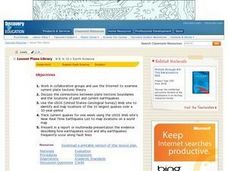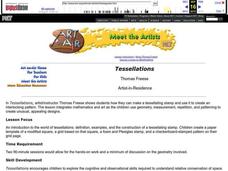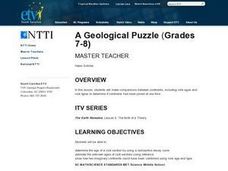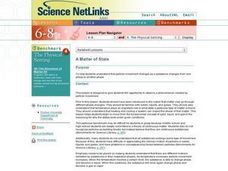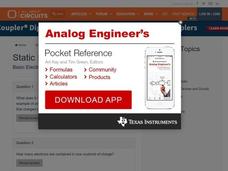Curated OER
Deviance: Functionalist Explanations
In this Deviance: Functionalist Explanations worksheet, students read five pages, then complete several exercises including creating prompt cards, labeling actions appropriately, and deciding what are strengths or weaknesses of theories.
Curated OER
In the Future we will all be Mixed Bloods and Mestizoes
Students examine the concept of origin and ethnicity. In this ethnic studies lesson plan, students engage in a variety of interdisciplinary activities including posters, and discussions to better understand our past and future.
Curated OER
Polymerization Experiments
Students study the concepts of polymerization and the function of crosslinkage. In this polymer lesson students complete a lab activity and write down their observations.
Curated OER
Earthquakes And Fault Lines
Students discuss major causes of earthquakes and identify famous fault lines, access and map information about ten largest earthquakes in world from 1989 to 1998, and theorize about location of these earthquakes as they relate to Earth's...
Curated OER
Introduction to Friction
Students study the properties of the frictional force between two surfaces in contact. They inspect various phenomena in nature where friction plays an important role and demonstrate
Curated OER
Analogy Lesson Plans That Make Connections
With the right analogy lesson plans students can get a handle on this important, and sometimes difficult, concept.
Curated OER
Using Java Applets for Inquiry-Based Physics Lessons
Using Java Applets in the physics classroom can be a great way to reinforce scientific concepts.
Curated OER
Tessellations
Students learn and review basic geometric terms, definitions, and theory, including regular polygons, lines, angles, points, etc. They make a tessellating stamp and create a repeating work of art.
Curated OER
An Introduction to Sensors
Students research the International System (SI) of units of measurements. They make measurements using the metric system. They study key concepts used in building and use of sensors, how sensors work and their role in measuring...
Curated OER
Beads, Balls, and Beakers
Young scholars analyze the amount of space required to pack round objects. In this geometry lesson, students practice using space economically by practicing packing spheres into beakers. They then translate this concept to molecules...
Curated OER
Pangaea Puzzle Pieces
Students i examine 10 pieces of evidence for the Pangaea theory and use them to reconstruct the super continent. They determine that land masses on Earth are slowly changing shape as a result of moving for millions of years.
Curated OER
Ideas That Lead to Probability
Students explore and define the concept of probability. They utilize a random number generator to determine the fairness of a game. Internet and printable versions fo the activities are included.
Curated OER
Energy Sources and Use
Students read and understand the importance of energy sources. In this Renewable and nonrenewable activity, students read an article to become familiar with the uses of energy. Students read an article and answer questions about fossil...
Curated OER
A Geological Puzzle
Young scholars compare and contrast the various types of rocks on each continent. In groups, the calculate the rock ages and types to determine if the continents, in their opinion, were joined at one time. They develop two imaginary...
Curated OER
A Day to Remember!
Students study math. In this real-life problem solving lesson, students work on their skills dealing with time and money. They work in small groups on various time and money word problems and by the final day they have a final problem...
Curated OER
African Americans in Science
Students explore the careers of prominent African Americans in science, mathematics, and technology. They use The Faces of Science: African Americans in the Sciences website, which includes profiles of past and present African Americans...
Curated OER
A Matter of State
Learners conduct science experiments to understand that particle movement changes as a substance changes from one phase to another phase. Students record observations of experiments that involve the three states of matter: solid,...
Curated OER
A Mendel Seminar
Students analyze Gregor Mendel's discovery of a process of biological evolution. They also explore how recessive and dominant traits are passed from one generation of living organisms to the next. This lesson involves environment...
Curated OER
Rain Forest Adventures
Young scholars discover locations of the world's rain forests. Once they identify the animals, plants, products, and resources located in them, they construct they own rain forest terrariums. By comparing and contrasting the two types...
Curated OER
Pythagoreum Theorem
Students practice assessing how to apply the formulas for the area of parallelograms and triangles. They recount the contributions of Pythagoras and apply the theories of the Pythagorean theorem in a group project to calculate the...
Curated OER
Traditional Marxist Perspectives on Crime
In this Marxist Perspectives on Crime learning exercise, students read five pages and then proceed to complete several exercises such as supporting and rejecting a thesis, completing sentences, and categorizing statements.
Curated OER
Static Electricity
In this static electricity worksheet, students complete nine questions about electron charges, coulombs, potential energy, voltage and the Van de Graaf generator.
Curated OER
Th'evenin's, Norton's, and Maximum Power Transfer Theorems
In this scientific theory worksheet, the student is asked 46 questions about equivalent circuits designed with differently constructed power sources. The answers are available if the student is working online.
Curated OER
Napolean Triangle
Students investigate the Napoleon triangle theory. In this polygon lesson, students differentiate between the boundary points, interior and lattice point of a polygon. They apply concepts of equilateral triangles to solve problems.





